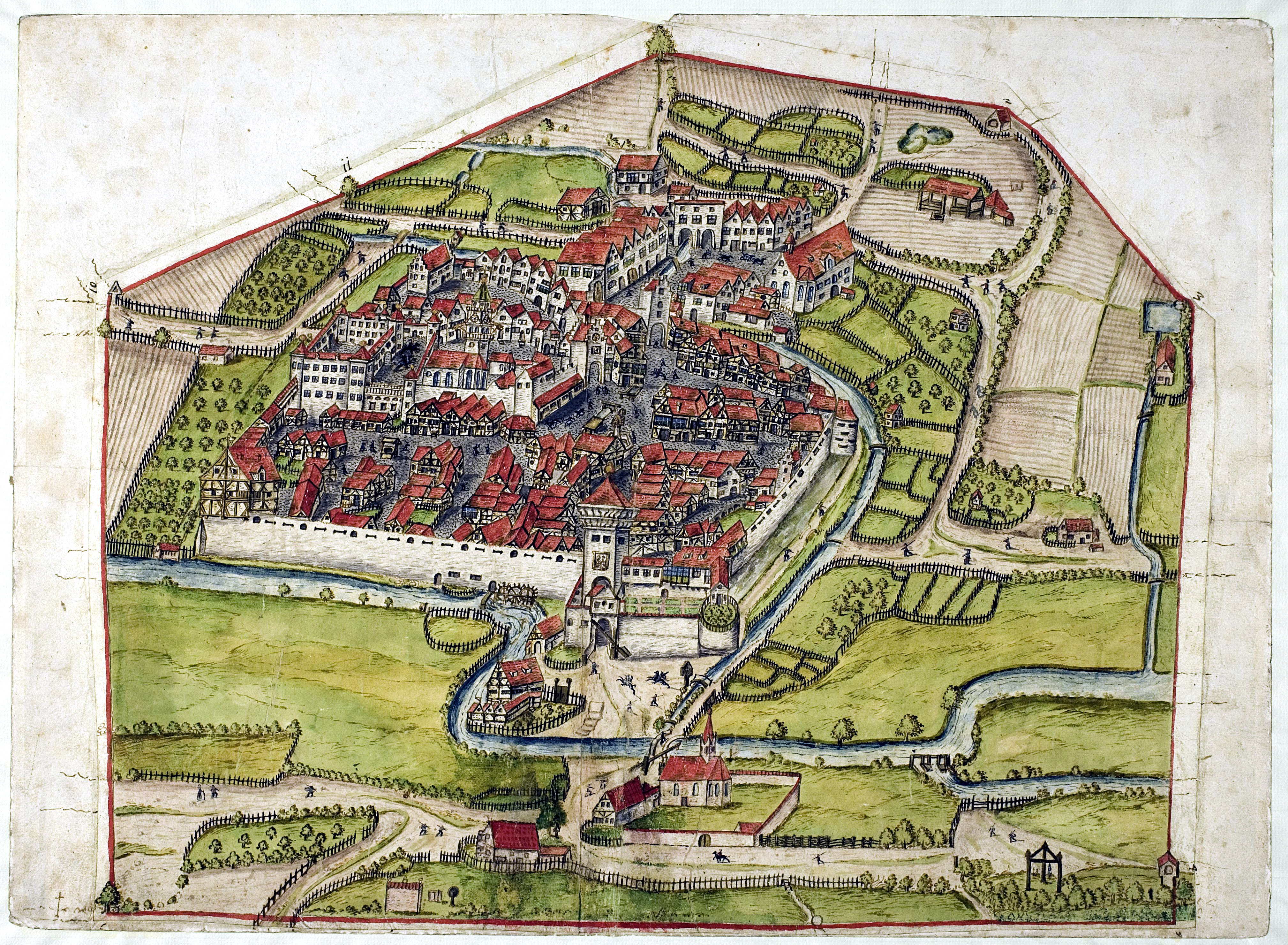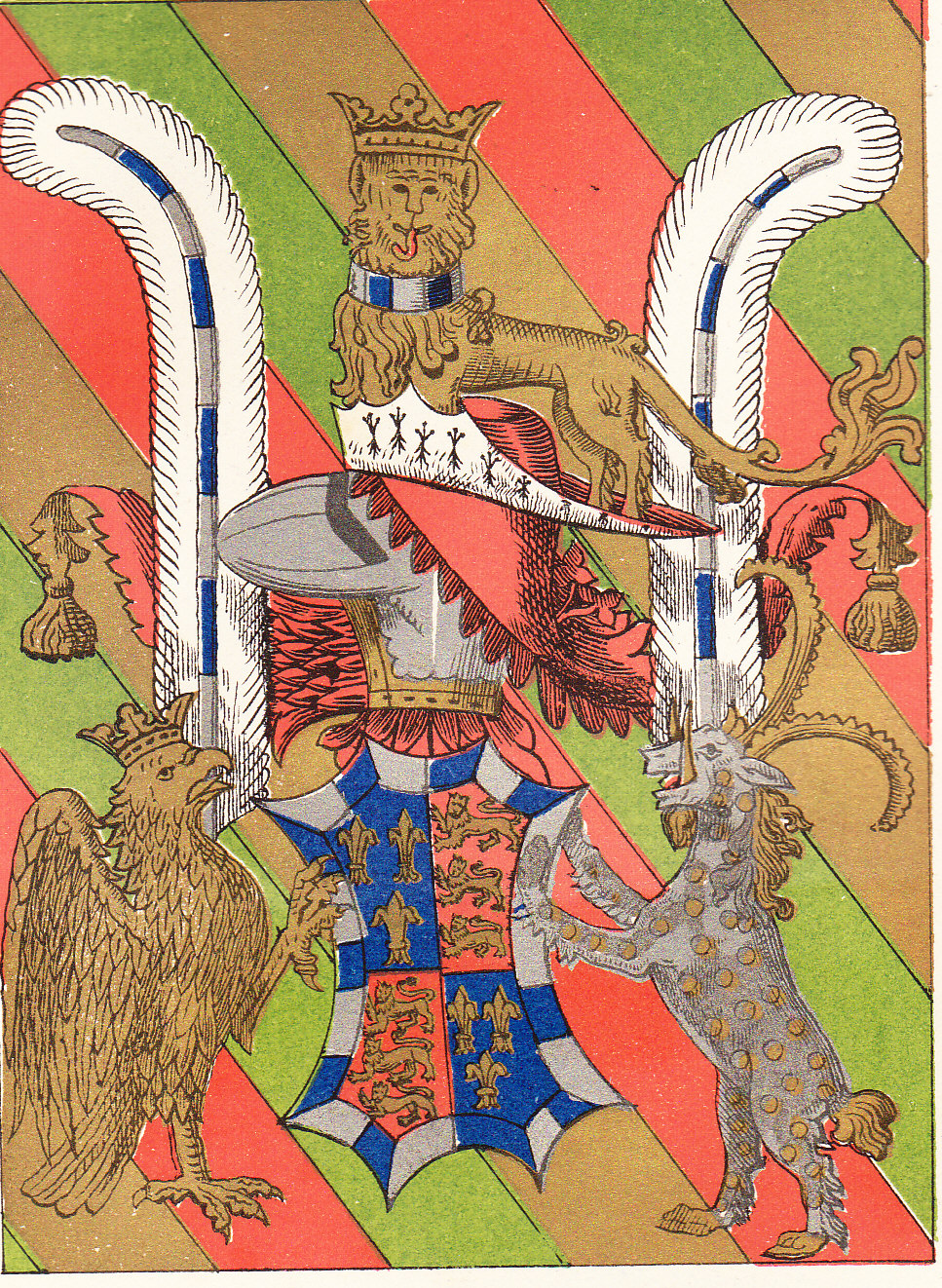|
Froben Christoph Of Zimmern
Count Froben Christoph of Zimmern (19 February 1519 – 27 November 1566) was the author of the '' Zimmern Chronicle'' and a member of the von Zimmern family of Swabian nobility. This article is based primarily on Beat Rudolf Jenny's biography of him.Jenny, 1959 Youth and student years Froben Christoph was born at Mespelbrunn Castle in the Spessart as the son of Johann Werner and his wife Katharina of Erbach. He was raised there and in Aschaffenburg by his step-grandfather Philipp Echter and his grandmother, the Countess of Werdenberg. He did not visit Meßkirch (Zimmern) until 1531. During a short stay at Falkenstein Castle, he had a conflict-charged meeting with his father. After that meeting, he moved in with his uncle Gottfried Werner in Meßkirch. In 1533, Froben Christoph and his elder brother Johann began studying at the University of Tübingen. After a stay in Strasbourg, he studied from early 1534 to 1535 in Bourges. During the winter of 1536/37, he stud ... [...More Info...] [...Related Items...] OR: [Wikipedia] [Google] [Baidu] |
Achievement (heraldry)
In heraldry, an achievement, armorial achievement or heraldic achievement (historical: hatchment) is a full display or depiction of all the heraldic components to which the bearer of a coat of arms is entitled. An achievement comprises not only the arms displayed on the escutcheon, the central element, but also the following elements surrounding it: * Crest placed atop a: * Torse (or Cap of Maintenance as a special honour) * Mantling * Helm of appropriate variety; if holder of higher rank than a baronet, issuing from a: * Coronet or Crown (not used by baronets), of appropriate variety. * Supporters (if the bearer is entitled to them, generally in modern usage not baronets), which may stand on a Compartment * Motto, if possessed * Order, if possessed * Badge, if possessed Coat of arms Sometimes the term "coat of arms" is used to refer to the full achievement, however this usage is incorrect in the strict sense of heraldic terminology, as a coat of arms refers to a garme ... [...More Info...] [...Related Items...] OR: [Wikipedia] [Google] [Baidu] |
Angers
Angers (, , ) is a city in western France, about southwest of Paris. It is the prefecture of the Maine-et-Loire department and was the capital of the province of Anjou until the French Revolution. The inhabitants of both the city and the province are called ''Angevins'' or, more rarely, ''Angeriens''. Angers proper covers and has a population of 154,508 inhabitants, while around 432,900 live in its metropolitan area (''aire d'attraction''). The Angers Loire Métropole is made up of 29 communes covering with 299,500 inhabitants (2018).Comparateur de territoire INSEE Not including the broader metropolitan area, Angers is the third most populous |
House Of Waldburg
The House of Waldburg is a princely family of Upper Swabia, founded some time previous to the 12th century; some cadet lineages are comital families. Eberhard von Tanne-Waldburg (? - 1234) was the steward, or '' seneschal'', and adviser of the Staufen dukes of Swabia, and later the adviser of the Emperor Friedrich II. During the anti-Staufen uprising, he and his brother Friedrich von Tanne took opposing sides. Friedrich was killed in 1197 in Montefiascone and Eberhard became the guardian of his nephew, Heinrich, until 1220. Subsequently, he and his nephew administered Swabia during the absence of the emperors. He was entrusted with the imperial regalia that was kept at Waldburg from 1220–1225, hence the name "seneshal," or ''steward''. Eberhard was the founding "father" of the Waldburg lines, and from him the medieval, early modern, and modern lines descend. History Alttrauchburg In 1258 the fief of Alttrauchburg had been given to the stewards of Waldburg, who purcha ... [...More Info...] [...Related Items...] OR: [Wikipedia] [Google] [Baidu] |
House Of Helfenstein
The House of Helfenstein was a German noble family during the High and Late Middle Ages. The family was named after the family castle, Castle Helfenstein, located above Geislingen an der Steige in the Swabian Alb region of Baden-Württemberg, Germany. The family held the rank of Graf or Count and was very significant in the 13th and 14th Centuries, but fell into financial difficulties and the family lost his estate in 1627. Later the main branch of the family emigrated to America and even today they are successor members of this German dynasty. Currently the german-argentinean Ernst Heinrich von Helfenstein have the honorary title by inheritance of Baron and Count by subsequent to his Father. Coat of arms The House of Helfenstein used an elephant on their coat of arms. According to one source, the elephant is a type of ''Namenwappen'' (German: Coat of Arms from a name), in this case Helfenstein became ''Elefanten'' or elephant because of similarity between the sounds. A mo ... [...More Info...] [...Related Items...] OR: [Wikipedia] [Google] [Baidu] |
Fürstenberg (princely Family)
Fürstenberg (also Fuerstenberg and Furstenberg) may refer to: Historical states * Fürstenberg-Baar, county (1441–1559) * Fürstenberg-Blumberg, county (1559–1614) * Fürstenberg-Donaueschingen, county (1617–1698) * Fürstenberg-Fürstenberg, county (1408–1441, 1704–1716) and principality (1716–1804) * Fürstenberg-Geisingen, county (1441–1483) * Fürstenberg-Heiligenberg, county (1559–1664) and principality (1664–1716) * Fürstenberg-Messkirch, county (1614–1716) and principality (1716–1744) * Fürstenberg-Möhringen, county (1599–1641) * Fürstenberg-Pürglitz, principality (1762–1806) * Fürstenberg-Stühlingen, county (1614–1704) * Fürstenberg-Taikowitz, county (1759–1806) * Fürstenberg-Weitra, county (1705–1806) * Fürstenberg-Wolfach, county (1408–1490) * Principality of Fürstenberg, county (1250–1408) and principality Cities and municipalities * Fürstenberg/Havel, a city in the district of Oberhavel, Brandenburg, Germany * Fü ... [...More Info...] [...Related Items...] OR: [Wikipedia] [Google] [Baidu] |
Bologna
Bologna (, , ; egl, label=Emilian language, Emilian, Bulåggna ; lat, Bononia) is the capital and largest city of the Emilia-Romagna region in Northern Italy. It is the seventh most populous city in Italy with about 400,000 inhabitants and 150 different nationalities. Its Metropolitan City of Bologna, metropolitan area is home to more than 1,000,000 people. It is known as the Fat City for its rich cuisine, and the Red City for its Spanish-style red tiled rooftops and, more recently, its leftist politics. It is also called the Learned City because it is home to the oldest University of Bologna, university in the world. Originally Etruscan, the city has been an important urban center for centuries, first under the Etruscans (who called it ''Felsina''), then under the Celts as ''Bona'', later under the Romans (''Bonōnia''), then again in the Middle Ages, as a free municipality and later ''signoria'', when it was among the List of largest European cities in history, largest Euro ... [...More Info...] [...Related Items...] OR: [Wikipedia] [Google] [Baidu] |
Meßkirch Schloss 1
Meßkirch (; Swabian: ''Mässkirch'') is a town in the district of Sigmaringen in Baden-Württemberg in Germany. The town was the residence of the counts of Zimmern, widely known through Count Froben Christoph's ''Zimmern Chronicle'' (1559–1566). Geography The municipality is composed of following villages and hamlets: ♯The Ringgenbach river flows through Dietershofen, then Ringgenbach, before its confluence into the Ablach east of Leitishofen †Heudorf is a location on the Upper Swabian Baroque Route ‡Menningen-Leitishofen was formerly a stop on the extant Radolfzell–Mengen railway Notable residents Meßkirch is the birthplace of composer Conradin Kreutzer, archbishop Conrad Gröber, writer and Georg Büchner Prize winner Arnold Stadler and, most famously, the philosopher Martin Heidegger. Also included are the well-known brewers Johann Nepomuk Schalk and his sons Herrmann and Oscar who began the Schalk Brewery in Newark, New Jersey, the first to bring lag ... [...More Info...] [...Related Items...] OR: [Wikipedia] [Google] [Baidu] |
Wilhelm Of Zimmern , the Dutch national anthem
{{Disambiguation ...
Wilhelm may refer to: People and fictional characters * William Charles John Pitcher, costume designer known professionally as "Wilhelm" * Wilhelm (name), a list of people and fictional characters with the given name or surname Other uses * Mount Wilhelm, the highest mountain in Papua New Guinea * Wilhelm Archipelago, Antarctica * Wilhelm (crater), a lunar crater See also * Wilhelm scream, a stock sound effect * SS ''Kaiser Wilhelm II'', or USS ''Agamemnon'', a German steam ship * Wilhelmus "Wilhelmus van Nassouwe", usually known just as "Wilhelmus" ( nl, Het Wilhelmus, italic=no; ; English translation: "The William"), is the national anthem of both the Netherlands and the Kingdom of the Netherlands. It dates back to at least 1572 ... [...More Info...] [...Related Items...] OR: [Wikipedia] [Google] [Baidu] |
Wilhelm IV Of Eberstein
Count Wilhelm IV of Eberstein (3 May 1497 – 1 July 1562) was a member of the Swabian noble Eberstein family. His father, Bernhard III (1459–1526) was president of the Reichskammergericht from 1510 to 1520. His mother was Countess Kunigunde of Sonnenberg (1472–1538). Like his father, Wilhelm IV served as president of the Reichskammergericht; he presided from 1546 to 1555. He and his wife are mentioned several times in the ''Zimmern Chronicle'', which was written by their son-in-law, Count Froben Christoph of Zimmern. In 1561, Wilhelm officially converted the County of Eberstein to Protestantism. He had been unofficially promoting the Evangelical faith for some time. He expanded his Neu-Eberstein Castle significantly. A tombstone depicting Wilhelm and his wife, has been preserved in the St. Jakob church in Gernsbach. Marriage and issue On 6 November 1522, he married Countess Johanna of Hanau-Lichtenberg (1507–1572), the eldest daughter of Philipp III, Count of H ... [...More Info...] [...Related Items...] OR: [Wikipedia] [Google] [Baidu] |
Etter Meßkirch 1575 1
Etter is a surname. Notable people with the surname include: *Albert Etter (born 1872), American horticulturist *Bill Etter (born 1950), American football quarterback *Bob Etter (born 1945), American football placekicker, bridge player, and professor *Carrie Etter (born 1969), American poet *David Wayne Etter (born 1944), American Material delivery engineer *Lior Etter (born 1990), Swiss footballer *Maria Woodworth-Etter (1844–1924), evangelist * Philipp Etter (1891–1977), Swiss politician * William H. Etter (born c. 1957), retired United States Air Force lieutenant general See also *Etter, California, former name of Ettersburg, California Ettersburg (also, Etter) is a locality in Humboldt County, California. It is located west-northwest of Phillipsville, at an elevation of . History A post office operated at Ettersburg from 1902 to 1906 and from 1915 to 1965. The settlement is ... * Etter, Minnesota, an unincorporated community * 20804 Etter, main-belt asteroid {{su ... [...More Info...] [...Related Items...] OR: [Wikipedia] [Google] [Baidu] |
Reichskammergericht
The ''Reichskammergericht'' (; ; la, Iudicium imperii) was one of the two highest judicial institutions in the Holy Roman Empire, the other one being the Aulic Council in Vienna. It was founded in 1495 by the Imperial Diet in Worms. All legal proceedings in the Holy Roman Empire could be brought to the Imperial Chamber Court, except if the ruler of the territory had a so-called '' privilegium de non appellando'', in which case the highest judicial institution was found by the ruler of that territory. Another exception was criminal law in which the Imperial Chamber Court could intervene only if basic procedural rules had been violated. The Imperial Chamber Court was infamous for the long time that it took to reach a verdict. Some proceedings, especially in lawsuits between different states of the Empire, took several hundred years. Some of the lawsuits had not been brought to an end when it was dissolved in 1806 following the downfall of the Holy Roman Empire. However, it has ... [...More Info...] [...Related Items...] OR: [Wikipedia] [Google] [Baidu] |
Wilhelm Werner Of Zimmern , the Dutch national anthem
{{Disambiguation ...
Wilhelm may refer to: People and fictional characters * William Charles John Pitcher, costume designer known professionally as "Wilhelm" * Wilhelm (name), a list of people and fictional characters with the given name or surname Other uses * Mount Wilhelm, the highest mountain in Papua New Guinea * Wilhelm Archipelago, Antarctica * Wilhelm (crater), a lunar crater See also * Wilhelm scream, a stock sound effect * SS ''Kaiser Wilhelm II'', or USS ''Agamemnon'', a German steam ship * Wilhelmus "Wilhelmus van Nassouwe", usually known just as "Wilhelmus" ( nl, Het Wilhelmus, italic=no; ; English translation: "The William"), is the national anthem of both the Netherlands and the Kingdom of the Netherlands. It dates back to at least 1572 ... [...More Info...] [...Related Items...] OR: [Wikipedia] [Google] [Baidu] |





